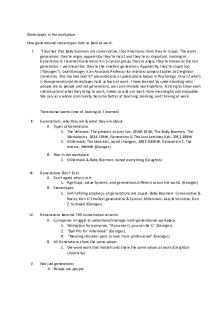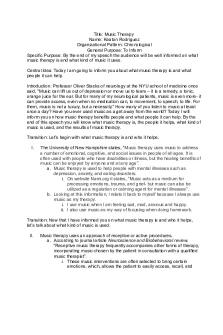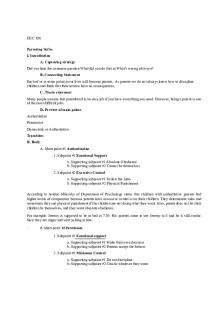Informative Speech Group ( Travel) group 4 PDF

| Title | Informative Speech Group ( Travel) group 4 |
|---|---|
| Author | NURUL QUSHIDA |
| Course | Communication |
| Institution | Universiti Teknologi MARA |
| Pages | 6 |
| File Size | 147.2 KB |
| File Type | |
| Total Downloads | 3 |
| Total Views | 142 |
Summary
this are the document that u will need for your group project and individual project. This report are for references purposes only....
Description
Title of Speech: Travel Specific Purpose Statement: To inform my audience about how travel makes you more open minded Central Idea: How travel makes you more open minded Pattern of Organization: (Chronological Order, Spatial Order, Causal Order, Problem-Solution Order, Topical Order) I.
INTRODUCTION: A. Attention Grabber/Getter: “The world is a book, and those who do not travel read only one page” B. Reveal Topic: Today we are going to talk about how travel makes us more open minded C. Credibility Statement: Traveling more often than not involves venturing out into the unknown. It involves traveling to a new place, meeting new people and engaging in new experiences. As travellers, we naturally have an adventurous spirit. It is part of who we are, and the more we travel, the more we feed this spirit. D. How topic related to audience: E. Preview of main points: travelling makes you more open minded where it exposed our self to discover variety of lifestyle, meet different people and try new things.
II.
BODY A. Main point 1: Travelling expose our self to discover variety of lifestyle 1. Sub-point – Meet people with different ethnic Sub-sub-point – Ethnic is a category of people who identify with each other, usually on the basis of presumed a common genealogy or ancestry or on similarities such as common language or dialect, history, society, culture or nation. There is more than hundred ethnics in the world and the only way to figure out these ethnicity is only by travelling. By knowing this ethnic, we will be able to understand how their lifestyle goes and understand why their belief is different. People who misunderstood some ethnic often someone who jump into
1
conclusion without even do research. Travelling helps us to see these ethnic and someday maybe you will be interest to try live with them. The more we travel the more we are able to accept and understand the differences that exist among us. This is why travelling can makes us more open minded as we are exposed to everything outside the place we came from. 2. Sub-point – we can see a lot of different culture Sub-sub-point – culture is an umbrella term which encompasses the social behaviour and norms found in human societies, as well as the knowledge, belief, arts, customs, capabilities and habits of the individuals in this group. By travelling, you will find a lot of exquisite culture that distinguish us form others. Seeing this culture will open our eyes to realize the differences that exist between us. Through the differences we are able to accept each other. We can also learn about their culture. How their lifestyle goes and what their belief hold onto. Travelling makes you more open minded as you learn to appreciate and respect each other culture. B. Main point 2: Gain new relationships and become more social 1. Sub-point – Travelling lead us to become more social. Sub-sub point – Most trips are associated with meeting new people. One of the most essential tools to have as a traveller is the ability to ask questions. For example, if you don’t know the direction of the place that you want to go, you have to communicate with someone for helping you. When travelling, you have the potential to meet more people than you would at home. You have a choice to enjoy your own company or interact with those setting out to try experiences just like you, many for the first time. Talking to new people is a great way to build-up your self-confidence. When interact with people from diverse backgrounds, you can strengthen your communication skills.
2. Sub-point – Makes new friend Sub-sub-point – Travelling also give us opportunity to makes new friend. We can meet new friend from different backgrounds. Making new friends can enrich and
2
rewarding experience, no matter how old you are. When you connect with someone, laugh about something together or share the same interests, there can be something really fun and exciting about it. Meeting new people might make you holiday getaway even more happy and positive. New friends may encourage you to try new activities and expose you the things that you would never have thought you’d like before. So, we can’t deny that travel can gain new relationships and become more social.
C. Main point 3: Try new things 1. Sub-point – Encourage us to get out of our comfort zone. Sub-sub-point - While travelling, you might find yourself stuck in situations you won’t normally experience in your daily life. Being in a place where you do not know anyone will assist you to gain more confident and encourage you to get out of your comfort zone. This can help you understand yourself and how you react to such circumstances, preparing you for future similar situations.
2. Sub-point – speak a language different from our native language Sub-sub-point – Language barriers are a common problem face by tourists while travelling. Because people speaking languages native to different regions. But while travelling we get the chance to learn difference language, especially to areas where our native language is not widely used, is that we can learn how to communicate better with other people. Travelling helps you connect with different people from different cultures and language. We can brushing up our knowledge on the most commonly used phrases or questions tourists ask can help us reach out to and relate better with the locals. By learning a different languages we can overcome language barriers.
D. Main point 4: 1. Sub-point – Sub-sub point –
3
2. Sub-point – Sub-sub point – Sub-sub point -
(Connective: Make sure the audience knows you are moving into the conclusion.)
III.
CONCLUSION I.
Reinforce the central idea: Everyone loves to travel, but some people may think that travelling is just a waste of time and money. Therefore, if they do know how travelling can encourage us to be more open minded and gives us a lot of benefits, it can be worth it.
II.
Signal the end of the speech – Do not just make travel as your dream. Make it happen so you are able to learn a lot of new things and experiences when you go for travel.
REFERENCES List complete citations for the research materials that you have used in your speech.
4
How to Write a Bibliography These guidelines follow those of the American Psychological Association (APA) and may be slightly different than what you’re used to, but we will stick with them for the sake of consistency. Notice the use of punctuation. Publication titles may be either italicized or underlined, but not both. Web versions of printed material
NA. retrieved on November 7, 2019 from http://en.wikipedia.org/wiki/Culture Sinead Mulhern. (June 18, 2019) “How travelling makes you open-minded” from http://www.worldpackers.com/articles/how-travelling-maes-you-more-open-minded Tom Willis. “Travel is key to building social and emotional life skills” from http://www.lifehack.org/489261/travel-is-key-to-biulding-social-and-emotional-life-skills Neal Samudre. (June 20, 2014) “15 secret to having the best perspective on life” from http://www.huffpost.com/entry/15-secrets-to-having-the-best-perspective-onlife_b_5145579 Jeremy Scott Foster. Retrieved on October 29, 2019 from http://travelfreak.com/bemefitsof-travelling/ Dumb Little Man. (November 19, 2018) “10 wonderful benefits of travelling) from http://www.dumblittleman.com/benefits-of-travelling/ The Gryphon Web Editor. (December 8, 2017) “How travelling makes you more openminded) from http://www.thegryphon.co.uk/2017/12/08/how-travelling-makes-you-moreopen-minded/ Sharon King Hoge. (December 3, 2018) “Advantages of travelling’ from http://www.aarp.org.com.au/meet-new-people-when-travelling.html Sahara Rose De Vore. (June 22, 2019) “Travel improves relationships and builds human connection” from http://thetravelcoachnetwork.com/2019/06/22/travel-improvesrelationships-and-builds-human-connection/ 5
Matthew Karsten. Retrieved on November 1, 2019 from http://expertvagabond.com/besttravel-quotes/
How to Cite Sources in the Text In-text citations alert readers to cited material and tell them exactly where to go and look. These citations work in conjunction with a bibliography. Usually, an in-text citation is a combination of a name (usually the author’s) and a number (either a year, a page number, or both). For Internet sources, use the original publication date, not your retrieval date. Internet sources also do not have page numbers, so use your discretion in the format that will direct the reader closest to the relevant section. You can number the paragraphs (abbreviate “par.”) or chapters (abbreviate “chap.”) or sections (abbreviate “sec.”). If there is no author listed, the document’s title should be used in place of the author’s name. Use the entire title but not the subtitle. Subtitles are anything appearing after a colon (:). Use a signal phrase A signal phrase alerts the reader to the fact that you are citing another source for the information he or she is about to read. Myers (1997) reported that “structured decision aids, as a factor in a more structured audit approach, are designed to focus the auditor on relevant information to improve effectiveness, and to improve audit efficiency, by eliminating the time needed to develop or organize individual approaches to the audit problems.” (sec. 1, “Introduction”) Note that the date goes with the author, directions within the document go with the quote. Later on, same source, different section: According to one study (Myers, 1997), inexperienced auditors from a structured firm will demonstrate higher audit effectiveness in the typical audit situation than inexperienced auditors from an unstructured firm. (sec. 2, “Structure and Audit Effectiveness”)
6...
Similar Free PDFs

Group Persuasion Speech
- 11 Pages

Group speech assignment
- 1 Pages

Group Speech Outline
- 3 Pages

Group Assignment STA404 Group 4
- 24 Pages

Group Speech Outline
- 4 Pages

Group Project - Speech
- 2 Pages

Informative speech
- 4 Pages

Informative Speech
- 3 Pages

Informative speech
- 3 Pages

Informative Speech
- 3 Pages

Business group assingmnent 4
- 16 Pages
Popular Institutions
- Tinajero National High School - Annex
- Politeknik Caltex Riau
- Yokohama City University
- SGT University
- University of Al-Qadisiyah
- Divine Word College of Vigan
- Techniek College Rotterdam
- Universidade de Santiago
- Universiti Teknologi MARA Cawangan Johor Kampus Pasir Gudang
- Poltekkes Kemenkes Yogyakarta
- Baguio City National High School
- Colegio san marcos
- preparatoria uno
- Centro de Bachillerato Tecnológico Industrial y de Servicios No. 107
- Dalian Maritime University
- Quang Trung Secondary School
- Colegio Tecnológico en Informática
- Corporación Regional de Educación Superior
- Grupo CEDVA
- Dar Al Uloom University
- Centro de Estudios Preuniversitarios de la Universidad Nacional de Ingeniería
- 上智大学
- Aakash International School, Nuna Majara
- San Felipe Neri Catholic School
- Kang Chiao International School - New Taipei City
- Misamis Occidental National High School
- Institución Educativa Escuela Normal Juan Ladrilleros
- Kolehiyo ng Pantukan
- Batanes State College
- Instituto Continental
- Sekolah Menengah Kejuruan Kesehatan Kaltara (Tarakan)
- Colegio de La Inmaculada Concepcion - Cebu




